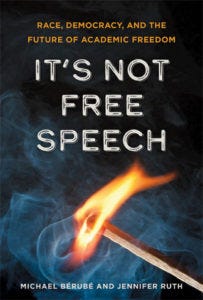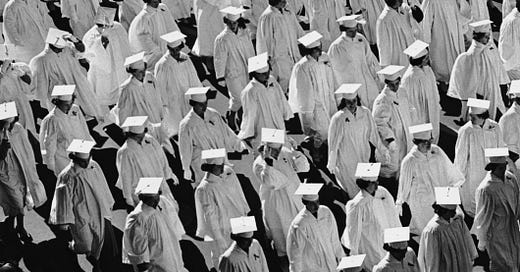Do We Really Need to Rethink Academic Freedom?
And how serious a problem is the “white supremacist professoriate”?
It’s Not Free Speech Race, Democracy, and the Future of Academic Freedom by Michael Bérubé and Jennifer Ruth Johns Hopkins, 293 pp., $29.95
When the Higher Education Research Institute first surveyed professors at four-year colleges, the far right barely registered; just 0.4 percent of the respondents so identified themselves, compared to 5.7 percent who labeled themselves far left. While there were more conservative professors, 15.7 percent, they were dwarfed by self-described moderates, at 38.8 percent, and liberals, who had a plurality at 39.5 percent.
That was more than thirty years ago. In It’s Not Free Speech, Michael Bérubé, a professor of literature at Pennsylvania State University, and Jennifer Ruth, a professor of film at Portland State University, are asking whether academic freedom is being used as a refuge for white supremacists. Their answer is yes, an answer so damning that, they say, it should make us “rethink academic freedom.” So, what’s changed?
Not the share of far-right professors. That’s still 0.4 percent in the most recent survey.
Other things have changed, but not to serve Bérubé and Ruth’s argument. There are now roughly as many self-described far-left professors (11.5 percent) as conservatives (11.7 percent). The ratio of liberals to conservatives has risen from a little over 2:1 to well over 4:1.
White supremacy in the academy wouldn’t seem to merit book-length alarm.
But Bérubé and Ruth are dedicated defenders of academic freedom. Both have served the American Association of University Professors (AAUP) as members of Committee A, which investigates complaints against universities and crafts “policy documents and reports” on academic freedom. This is not only hard, mostly thankless, work but also an opportunity to keep an eye on American campuses. When they say that the problem of “tenured white supremacists” is weighty enough to prompt “new thinking” about academic freedom, we owe them a hearing.
However, when we search It’s Not Free Speech for reasons to think that the academy harbors white supremacists, we find a handful of cases. There’s Amy Wax of the University of Pennsylvania Carey Law School, whose brand of nationalism implies that “our country will be better off with more whites and fewer non-whites.” There’s Bruce Gilley of Ruth’s own Portland State, who thinks not only that “Western colonialism” was defensible at times in the past but also that a “colonial governance agenda,” suitably modified, is right for our present. These cases have drawn much attention. But Bérubé and Ruth’s Exhibit A for the proposition that “the problem here is unfathomably larger than any one Bruce Gilley or Amy Wax” is “the case of Gregory Christainsen.” Bérubé and Ruth call this case “central” to their argument. Let’s look at it closely.

Christainsen is a professor emeritus of economics at California State University-East Bay. He had been a full professor there for nearly 25 years when he took up, in writing and the classroom, “race realism,” according to which racial inequalities reflect natural inequalities. A 2014 anonymous student complaint did nothing to damage Christainsen’s good standing. He was not “fired—or rebuked, or censured, or disciplined.” Christainsen’s case, say Bérubé and Ruth, shows the “entrenched, unshakeable beliefs of the white supremacist professoriate.”
The facts that Bérubé and Ruth volunteer show no such thing. They show something duller. Full professors are rarely reviewed with care. Anonymous complaints, whatever their merits, rarely trump decades of service. That may not be defensible, but it’s not a sign of white supremacy’s strength in out universities.
Bérubé and Ruth don’t volunteer that when Christainsen’s work became more widely known, CSU’s academic senate voted 32-1 to censure him for “racist scholarly activity” and requested that he be “relieved” of his remaining teaching duties, already limited since his early retirement in 2016. Just one person, a black colleague who had known Christainsen for 29 years, spoke against the resolution. CSU’s administration didn’t forbid Christainsen to teach, but he has apparently not been in a classroom since. More than eighty CSU professors, drawing in part on the Christainsen case, publicly urged the provost not to reappoint Christainsen’s department chair, Jed DeVaro. DeVaro was not reappointed.
That’s Bérubé and Ruth’s best shot at establishing the magnitude of the problem their book addresses. For this we need to rethink academic freedom?
Let’s consider, nonetheless, the rethinking they have in mind. The case for academic freedom rests on the distinct way in which universities serve the public. The “common good,” says the widely adopted 1940 AAUP Statement of Principles, “depends upon the free search for truth and its free exposition.” Trustees and legislators, the argument goes, should give professors the widest latitude in teaching, research, and their speech as citizens, because their intervention can undermine free inquiry. And free inquiry, although we cannot foresee its precise results, is a public benefit. This case flies only if people who might otherwise try to bend the university to serve their passions and interests bet, instead, that universities will serve us better as homes of reason than they will as carriers of someone’s creed.
Doubts about that bet often come from conservative outsiders, who think it naïve. Academic freedom may be good in theory, they say. But in practice, it protects antiwar activists, or Communists, or critical race theorists, for whom universities are assets in a propaganda war. (This was the central argument of one of the ur-texts of modern American conservatism, William F. Buckley’s 1951 book God and Man at Yale.) It’s Not Free Speech is a sign that insiders have doubts, too. To “many younger scholars,” with whom Bérubé and Ruth sympathize,
ideals like academic freedom look like hazy, high-minded beliefs cherished by old white people oblivious to the way in which right-wing provocateurs . . . weaponize the freedoms they enjoy.
This threat, Bérubé and Ruth suggest, should provoke us to rethink academic freedom in two ways.
The first rethinking is more of a reminder. Academic freedom is not free speech. I enjoy free speech at my local park, where I can talk about whatever I like. In my classroom, I cannot, without drawing the disapproving attention of my dean, turn my Byzantine Art class into an extended meditation on Trumpism. As a historian, I’m free to write The Holocaust Deniers Had It Right. But when my department denies me tenure because I’m incompetent, I can’t complain that my academic freedom has been violated. As a citizen, I am free to tweet, “the college won’t let me exclude bloodsucking Zionists from my course, but come grading season, I shall exact sweet revenge.” But even fierce advocates of academic freedom will concede that such a tweet raises questions about my fitness that warrant investigation.
Academic freedom means not that there are no limits on what I can say but that limits are set by the demands of research and teaching, not the demands of trustees and the public. Bérubé and Ruth worry that many of their colleagues accept “an excessively libertarian conception of academic freedom” that renders such limits meaningless for tenured professors like Gregory Christainsen.
The second rethinking is more fundamental. Drawing on critical race theory, Bérubé and Ruth argue that just as purportedly neutral laws “legitimate existing maldistributions of wealth and power,” so also does the academy’s “fetishization of a mythically neutral pursuit of truth” provide cover for the powerful. For that reason, academics should abandon the pretense of neutrality. On the understanding of academic freedom that has prevailed for over a century, the university serves democracy indirectly by supporting “the unrestricted research and unfettered discussion of impartial investigators,” moved by “scientific conscience.” On the understanding of academic freedom that Bérubé and Ruth propose, ideas are to be judged not only on how they reflect the best available arguments and evidence but also on whether they reflect a commitment to “furthering democracy.”
In practice that means that the faculty academic freedom committees Bérubé and Ruth assign the task of “evaluating competence” should think of competence both “in standard disciplinary terms” and “in its democratic valence.” Such committees will “make judgment calls . . . that take into consideration the historical and political circumstances in which their universities find themselves.” A classicist’s conspiratorial tweet about the faking of the moon landing, on this understanding, may require less aggressive intervention than his conspiratorial tweet about #StopTheSteal.
Bérubé and Ruth acknowledge that even in the narrow work of evaluating scholars in their own fields of expertise, professors go astray and mistake challenges to the present state of their field for incompetence. What then, of the broader work of evaluating the “democratic valence” of ideas in light of the “historical and political circumstances” that the university confronts? Experts in physics may make errors in judging their fellow physicists, but at least they are well equipped to judge. It is hubris to think that faculty committees are competent to assess the historical and political circumstances, then measure the harm to democracy that might result from a colleague’s article or tweet.
In presenting their own judgments about our nation’s historical and political circumstances, and what we should make of them, Bérubé and Ruth issue standard but disputable pronouncements. We’ve learned, they say, from social media that mass communication isn’t a “big coffee shop in which people exchange reasoned ideas.” But we’ve known that since the adoption of the printing press. We’ve learned, they say, from the rise of Donald Trump and the alt-right, to doubt “liberal shibboleths about . . . the so-called marketplace of ideas.” But no thoughtful liberal holds that the metaphorical marketplace of ideas guarantees the triumph of good ones, any more than they hold that due process guarantees just outcomes, or that elections ensure wins for the good guys. Free speech, Bérubé and Ruth say, may have helped dissenters in the early 1990s, but since then the courts have “decisively tilted the First Amendment in the favor of corporations and religious conservatives.” Nothing they say subsequently earns them that “decisively.”
Throughout, Bérubé and Ruth depict “liberals” as lovers of abstractions who look past hard realities. Liberals don’t get, for example that “supporting free speech for Nazis is actually quite beneficial to Nazis.” Aryeh Neier, who as executive director of the ACLU, defended the right of neo-Nazis to march in Skokie, was a refugee from Nazi Germany. The Nazis murdered his extended family. But what does a fellow like that know about Nazis? What did the architects of the AAUP’s 1940 academic freedom statement know about political illiberalism? Only we who have been stung by Facebook and Fox News understand that the old ways have failed.
That a myopia of the present this powerful afflicts academics like Bérubé and Ruth, who know more about the history of academic freedom than most, doesn’t inspire confidence in faculty committees as guardians of democracy.
If that’s the future of academic freedom, count me out.




